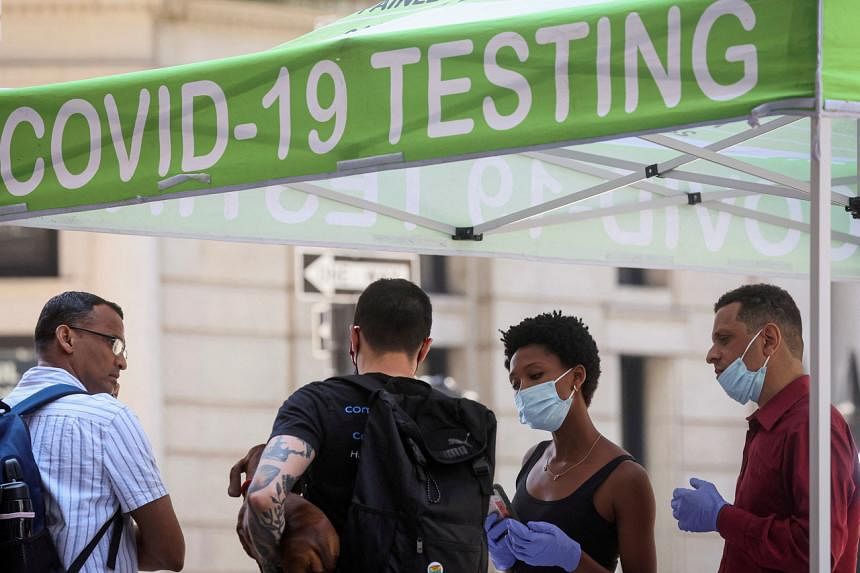WASHINGTON - Long Covid-19 eases with time, according to a study that found about 1 per cent of coronavirus patients had persistent symptoms for a year or more.
In the first rigorous assessment of the magnitude of long Covid-19 on a global scale, researchers found 6.2 per cent of people who had Covid-19 in the pandemic's first two years experienced at least one of three main groups of symptoms three months later. Of those patients, 15 per cent were still afflicted after a year, they found.
Although the probability of having chronic health problems from Covid-19 is relatively low, the vast number of cases - at least 670 million worldwide - leaves a substantial burden of disability, said Dr Christopher Murray, director of the Institute for Health Metrics and Evaluation at the University of Washington, where the study was conducted.
Long Covid-19's effects are, on average, similar to what occurs after a moderate-to-severe traumatic brain injury or complete deafness, said Dr Theo Vos, a professor of health metrics sciences at the university, who led the study.
The study, published on Monday in the journal JAMA, helps explain why as many as four million Americans have dropped out of the workforce in the wake of the pandemic and why long Covid-19 may cost $3.7 trillion (S$5.3 trillion) in the US alone.
More than 94 million cases and 1 million Covid-19 deaths have been reported in the US, where the coronavirus infected almost 42,000 people a day on average in September.
The research is based on data from 1.2 million Covid-19 patients in 22 countries gathered from 54 studies and two medical record databases, including from the US Veterans Affairs health system.
More than 200 ailments have been linked to long Covid-19, but the study in JAMA collated information on three common clusters of symptoms.
It found that three months after a coronavirus infection, 3.7 per cent of patients had ongoing respiratory problems, 3.2 per cent had persistent fatigue with bodily pain or mood swings and 2.2 per cent had cognitive problems, after adjusting for their health status before Covid-19.
It's not uncommon for Covid-19 patients to experience persistent symptoms for a month, but most have fully resolved or diminished significantly after three months, said Dr Sarah Ryan, a doctor at Columbia Primary Care in New York.
Dr Ryan, who has been caring for long Covid-19 patients for more than two years, says that in her experience, "a handful" have severe problems a year after their infection. "But the good news for the public is that they're a small minority," she said.
The risk of getting durable long Covid-19 symptoms increases with the severity of the acute infection, the study in JAMA found. The average duration of long Covid-19 was nine months for people who were hospitalised for the coronavirus, compared with four months for people who fought off the virus at home.
Among patients older than 20 who caught Covid-19 three months earlier, persistent symptoms occurred in 10.6 per cent of women and 5.4 per cent of men.
It's not known yet what causes long Covid-19, though several risk factors are associated with the condition, said Michael Peluso, an infectious diseases physician-scientist at the University of California, San Francisco, who's been studying Covid-19's lingering effects in patients since March 2020.
"Women tend to be more affected than men," Dr Peluso told a university forum on Thursday. The probability of developing long Covid-19 is higher among people who are "middle age, rather the extremes of age", those with pre-existing medical conditions and obesity, and in individuals with lower socioeconomic status and poorer access to health care, he said.
The latest analysis accounts for Covid-19 cases through the end of 2021, before omicron variants fueled an unprecedented surge in infections. UK data suggest the hyper-infectious omicron clan of strains is much less likely to cause long Covid-19 than the delta variant that preceded it.
Long-haul symptoms aren't the only health threat to Covid-19 survivors. Diabetes and life-threatening conditions including heart attacks, stroke and kidney damage are more common in Covid-19 patients than those who avoided the pandemic disease.
"The pandemic will raise the baseline risk of disease and disability to a new level," said co-author Ziyad Al-Aly, chief of research and development at the Veterans Affairs St. Louis Health Care System, whose own studies have led to important early findings about long Covid-19. BLOOMBERG

